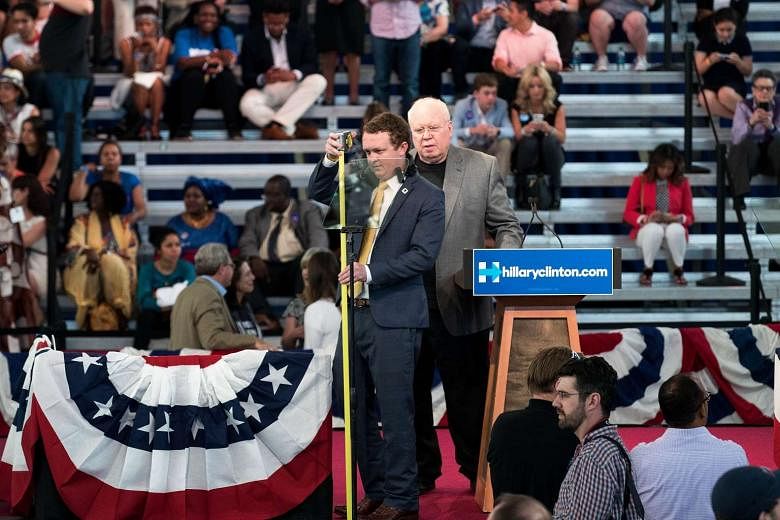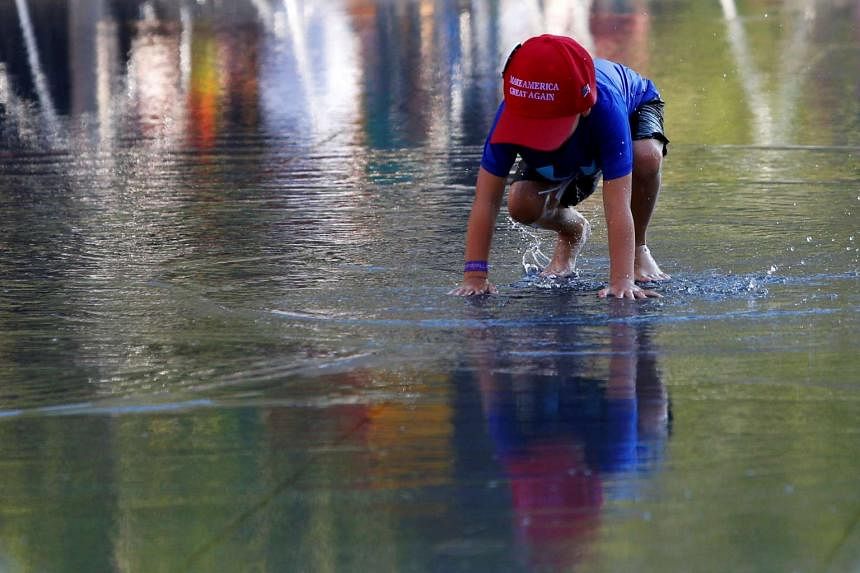In an era where a presidential candidate is expected to have at least a nine-figure war chest to get elected, the current campaign looks set to be among the most frugal in recent times.
While President Barack Obama and his Republican opponent Mitt Romney spent over US$1 billion (S$1.36 billion) each on the presidential race four years ago, this year - with just over two months to go before the Nov 8 election - both Mrs Hillary Clinton and Mr Donald Trump are chalking up far smaller bills.
The latest financial filings from both candidates - the first since both exited their respective primaries and entered general election mode - provided a look at just how the money race is shaping up.
And by looking at how much money the two campaigns have raised and what the money is being spent on, one can tell a lot about their styles and what is important to the respective candidates.
While a large chunk of campaign funds tends to go towards buying advertising, there are many other elements - from paying lawyers to buying hats.
-
The money race
-

DONALD TRUMP (REPUBLICAN)
MONEY RAISED TO DATE: US$128 million
MONEY SPENT: US$89 million
CASH IN HAND: US$38 million
SPENDING IN JULY
• Payroll for staff: US$430,000
• Media: US$8.4 million
• Merchandise: US$1.8 million
• Private jets: US$2.4 million
WHERE THE MONEY IS COMING FROM (TOP INDUSTRIES):
• Lawyers/law firms: US$376,000
• Securities and Investment: US$330,000
• Hedge funds: US$124,000 (Trump has put US$52 million of his money into the campaign)

HILLARY CLINTON (DEMOCRAT)MONEY RAISED TO DATE: US$327 million
MONEY SPENT: US$268 million
CASH IN HAND: US$58 million SPENDING IN JULY
• Payroll for staff: US$3 million
• Media: US$26 million
• Merchandise: US$140,000
WHERE THE MONEY IS COMING FROM (TOP INDUSTRIES):
• Lawyers/law firms: US$23 million
• Securities and Investment: US$6.4 million
• Internet firms: US$1.8 million
SOURCES: FEDERAL ELECTION COMMISSION, CENTRE FOR RESPONSIVE POLITICS
One of the clearest takeaways from the last report is just how big a lead Mrs Clinton currently holds over Mr Trump in the money race.
According to their Federal Election Commission filings, the Democrat raised more money, spent more money and holds more cash in hand for the race ahead than the Republican.
Last month, Mrs Clinton raised US$52 million compared with Mr Trump's US$37 million, spent US$38 million compared with his US$18 million, and ended the month with a war chest of US$58 million, compared with his US$38 million. This despite July being Mr Trump's strongest month of fund- raising yet.
All in, Mrs Clinton's campaign has spent some US$268 million to date and Mr Trump's, just US$89 million. The former secretary of state's July financial filings had 18 pages of itemised disbursements. The tycoon needed just three.
The gap - which does not even include spending by outside groups - emphasises some of the many traditional campaign features that Mr Trump is simply not paying for.
The billionaire has barely expanded the bare-bones field operations he had in the primaries for the general election, keeping just 84 people on the payroll, compared with Mrs Clinton's 703 staff members.
While her campaign spent over US$26 million last month on media production and ad buys, Mr Trump's filings show he paid just US$8.4 million to a digital advertising firm, to help boost his campaign's online fundraising operation.
He paid another US$9,000 on Facebook ads. He did not buy any airtime. But Mr Trump is not getting outspent on everything.
For instance, his own airline Tag Air charged his campaign nearly US$500,000 for the private jet he flies around in, while a further US$1.9 million was paid to Private Jet Services, an aviation consulting firm and private jet charter broker.
Then there is the question of merchandise. The "Make America Great Again" caps that are ubiquitous at Trump events these days do not come cheap. The tycoon spent US$420,000 last month alone just on hats. Another US$1.4 million went to other merchandise like T-shirts, mugs and stickers.
At US$1.8 million, merchandise is the Trump campaign's third largest campaign expense last month.
In contrast, Mrs Clinton paid around US$140,000 for her merchandise in the same month.
As far as where the money is coming from, the Washington Post found that Mr Trump receives around one-third of his money in donations from small donors giving US$200 or less, while small donations make up only 18 per cent of Mrs Clinton's receipts.
These numbers do not offer much insight into who has more grassroots support, however, as Mr Trump's absolute amounts are currently dwarfed by his opponent's.
What is clear is that neither can match the mobilising power of President Obama, a sign that there isn't a lot of enthusiasm for either candidate. Mr Obama did not just raise more in absolute amounts in 2012, he also got 37 per cent of his money from small donors.
Still, by far the biggest funder of the Trump campaign appears to be the candidate himself. Mr Trump has thus far pumped US$52 million into his own campaign.
The big question then is whether being ahead in the money race signals a win at the ballot box?
The answer, say analysts, is "most of the time".
Ms Sarah Bryner, research director at the Centre for Responsive Politics, a leading research group on money and politics, said that often, the more popular candidate attracts more money and so the leader in the money race wins the day.
But there have been upsets.
"One famous example a couple of years ago is House majority leader Eric Cantor losing to a college professor and he was up in the fundraising by the order of millions of dollars," she told The Sunday Times.
" When people are upset with the current political climate, it is more common for people to come out of nowhere and upend the political elite. But generally, more successful fundraising is a sign that the candidate is more likely to do well in the election."


